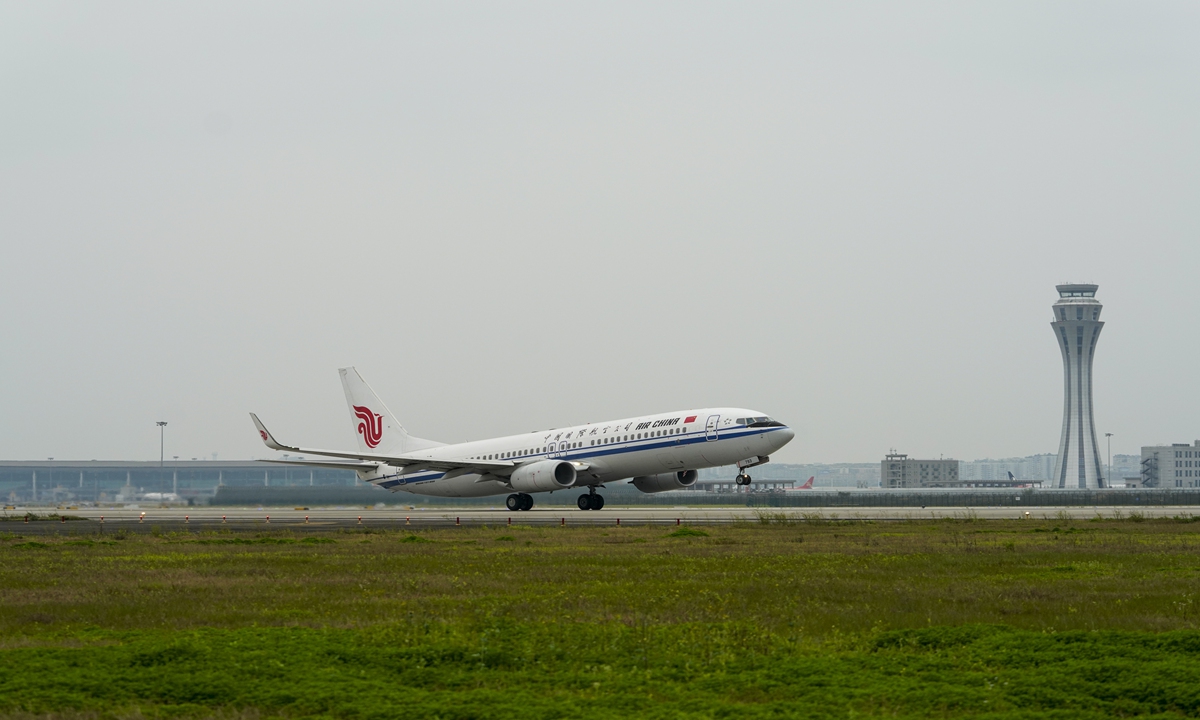
An Air China aircraft takes off from Chongqing Jiangbei International Airport in March 2020. Photo: cnsphoto
The 40-day Spring Festival travel begins on Thursday. Different from previous years, there will be strict measures targeting COVID-19 cases from people and chilled or frozen goods.
The civil aviation regulator said that the whole industry continues to put preventing imported COVID-19 cases as their core mission.
The regulator also said it will complete the vaccination of frontline employees before the Spring Festival holidays.
Air China said it will strengthen prevention and control measures for front-line personnel in contact with the cold chain and cargo transportation, and standardize the operation procedures of cargo handling and disinfection.
Those measures came against the background of a continuing global epidemic. China has also recently witnessed rising cases across several municipalities with viral matter often found on the outer packaging of imported products.
The latest news is enterprises form Russia, Indonesia, Pakistan and Brazil were suspended of import declaration by Chinese customs for one week after their cod, pan-fried mackerel, cuttlefish and chicken thigh samples were tested positive for COVID-19 respectively.
Shijiazhuang, the capital of North China's Hebei Province announced on Sunday the suspension of fruit imports, removal of on-shelf products and sealing stocks after detecting coronavirus on a batch of imported cherries at a wholesale market.
Aside from imported cherries, more imported food products, including red king crab, pork and ice cream have been found with the virus on their outer packaging.
Cities also conduct check. For example, Shanghai has been conducting targeted management procedures for cold-chain products while conducting massive nucleic acid tests on goods and produce.
As of Saturday, 32,733 boxes of food products have been tested since November 16, while seven batches of products have tested positive on their outer packaging for coronavirus, accordion to local authority.
Several local CDC bodies have also issued guidelines for those in the cold-chain industry to protect themselves from being affected.
China's CDC deputy director Feng Zijian said in an earlier interview that when the temperature remains low during the winter and people travel, the logistics volume also increases. He said that we should remain cautious on cold-chain products contaminated by the virus, which will increase the risks for imported infections.
All international freight transported by air, land and sea becomes just like cold-chain logistics as winter approaches, which means they could become carriers of COVID-19, Wu Zunyou, chief epidemiologist at China's CDC, also said earlier.
Airlines also said they will take measures to implement strict virus control precautions. China Eastern Airlines said they will transfer some wide-body aircraft that originally operated on international routes to domestic routes, and some flights with less than 60 percent of load factor will be locked seat to provide more room for travelers.
No more travel rush The pandemic has no doubt impacted the aviation industry.
As of noon Thursday, more than half of scheduled passenger flights have been cancelled on the first day of the 40-day Spring Festival travel peak starts, data from information provider VariFlight showed.
During the 2021 Spring Festival travel period, pre-sales of air tickets departing and arriving in Beijing have dropped by more than 60 percent compared with the level of 2019 and 2020, travel platform qunar.com said.
Civil Aviation Administration of China (CAAC) predicted on Tuesday that the number of trips in the 40-day travel peak will be around 39 million, almost the same as last year, but the prediction is far lower than that in 2019, which was around 73 million.
A subdued travel peak also damped the profit predictions for airlines. A report released by Guotai Junan Securities said last week that the airlines in 2021 are also facing various degrees of unprofitability, with the vaccine the main hope for avoiding a crippling hit to industry revenue.
The Chinese airline industry may face a big blow as the regulator said on Tuesday that tickets sold for the Spring Festival period must be refunded without charge if necessary, adding to the twin challenge of low load factors and cheap fares caused by the pandemic.
The International Air Transport Association (IATA) also said latest airline financial data for the third quarter shows that airlines in all regions posted another quarter of net loss. While North America carriers report the largest net loss, Asia-Pacific airlines' net loss declined compared with the previous quarter amid the recovery in large domestic markets and the strong cargo revenues.
Looking forward, airlines will continue to suffer from dampened demand and turning cash positive will be the key target for the industry, IATA said. It predicted a possibility of turning cash positive at aggregate level in the fourth quarter but until then further support for survival from governments will be critical.




